 Petzlover
PetzloverAsian is originated from United Kingdom but Singapura is originated from Singapore. Both Asian and Singapura are having almost same weight. Both Asian and Singapura has almost same life span. Both Asian and Singapura has almost same litter size. Both Asian and Singapura requires Low Maintenance.
Known also as the Malayan, the Asian cat is likened to the Burmese but just with different coat patterns and colors.
This particular cat breed was developed in 1981 in the UK. Apparently there was a mistake mating between a Lilac Burmese and a Chinchilla Persian and kittens from these were born in 1981.
So beautiful were they that a breeding program started with new coat colors and patterns. The breed got the name ‘Asian’ with all the varieties reaching GCCF Championship status.
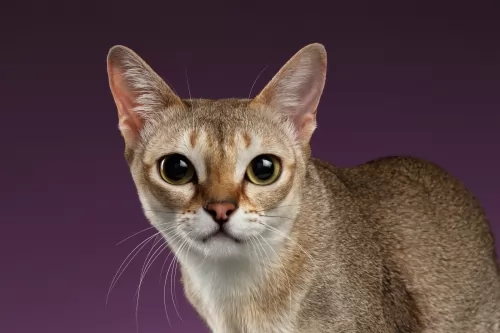 There are conflicting stories surrounding the origination of the Singapura. It does seem however, that natural Singapurans were found in Singapore.
There are conflicting stories surrounding the origination of the Singapura. It does seem however, that natural Singapurans were found in Singapore.
The first documented account was of a cat known as Chiko who was found in a Singaporean SPCA in 1980 by Sheila Bowers and WA Brad.
The Asian cat is medium-sized and muscular. The male cat is somewhat bigger than the female and weighs roughly 5 – 7kg while the female will weigh roughly 3 – 5kg although most times, there is not much difference in size between the males and females.
The attractive cat has a round head and wide-spaced ears with large green eyes. It’s a slender cat, but athletic with slender legs and medium thickness tail. Asian cats come in a wide range of colors such as fawn, chocolate, black, blue, cinnamon. The coat is short, fine, and silky and the Asian doesn’t require too much grooming.
These are friendly, playful cats and they get on well with children if the children are kind, gentle and respectful with him. This is a fairly dependant cat and he will actually follow his favorite human being, crying out for attention.
The Asian is a social cat and can fit well into different homes. However, because it is a social cat, they require an owner that is willing to spend time with them. They’re cats that are sensitive to the moods of their owners and make excellent companions.
They’re adventurous cats and enjoy exploring and traveling, voicing their opinion on different things as well. The Asian thrives on the attention it gets from their human owners. It’s a sociable cat and is quite talkative too.
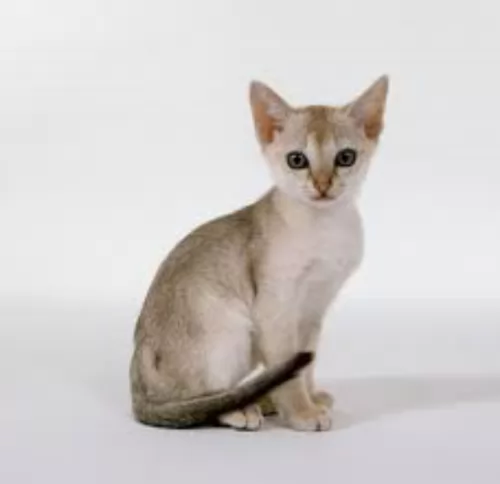 The Singapura cat is small in size, not weighing more than 2, 3 or 4kg. This short-haired, ivory-colored coat has brown ticking.
The Singapura cat is small in size, not weighing more than 2, 3 or 4kg. This short-haired, ivory-colored coat has brown ticking.
The cat is a natural breed and is muscular and strong. It is actually the smallest of the domestic cats. The cat has big ears, large green or yellowish eyes and is often referred to as ‘Pura’.
While the Singapura looks like a small, finely boned cat, when you pick him up, you discover that he is actually deceivingly heavy. The cat has slender legs with the back legs being slightly longer than the front legs. The tail ends with a recognizable black tip.
The Pura is intelligent and inquisitive and loves leaping onto high surfaces to explore. They then love to come bounding down and to land in one of his family member’s laps. This cat is a bundle of energy and playfulness. You'll need to invest in toys for your fun-loving Pura who loves nothing more than to be playing with soft little balls or scampering after a toy-mouse.
He is social and extroverted and gets along well with children and dogs in the house. He isn’t as vocal as some of the other cat breeds and actually has a quiet voice. The Singapura cat personality is outgoing, active and inquisitive and full of tricks and he is always ready to join in with any games.
The Asian cat is such a sweet animal – gentle and affectionate and also very sociable. They are also curious and intelligent and vocal enough to let you know their needs. They're strong-willed if they want something.
The Asian makes an excellent companion for singles, couples, families or the elderly. They also get on well with children and with other pets in the home.
There are quite a few Asian cat varieties and each one promises to make you an excellent companion.
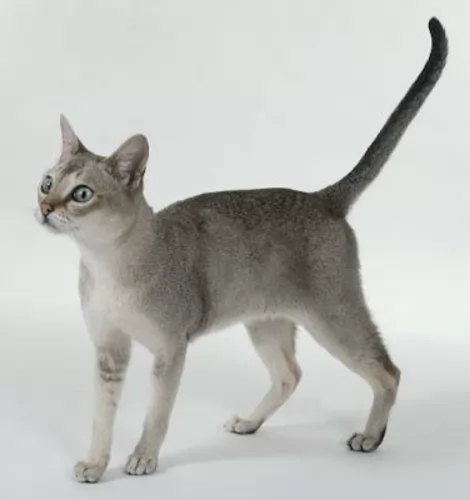 Singapuras make awesome pets and with all their energy and antics they provide hours of entertainment. They are intelligent, energetic, and playful. The people who have them say they become your best friend because they are cats that are sensitive to the moods of their human owners.
Singapuras make awesome pets and with all their energy and antics they provide hours of entertainment. They are intelligent, energetic, and playful. The people who have them say they become your best friend because they are cats that are sensitive to the moods of their human owners.
Dynamite comes in small packages, and that’s exactly what you get when you bring the small Singapura cat into your home and life.
Although there are no specific health issues with this cat, because of it being associated with the Burmese, it may be more susceptible to diabetes mellitus than other breeds.
There are many cats in modern times developing diabetes mellitus – where they are unable to produce enough insulin to balance blood sugar. If the disease goes untreated it can lead to dehydration, vomiting, depression, weight loss, and even death. Your cat will be thirsty and urinating more frequently. There are various treatments and the diet for the cat will need to change too.
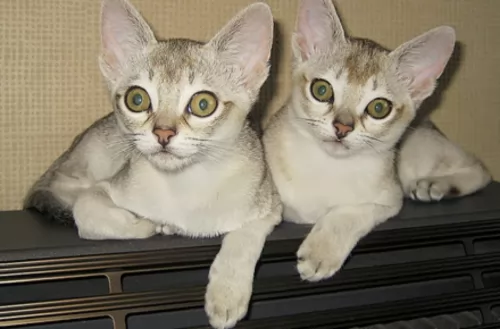 Your sweet Singapura cat has no particular genetic problems to deal with and also no specific health concerns. Although he is a generally healthy cat, one health condition that you want to be aware of is uterine inertia with the females.
Your sweet Singapura cat has no particular genetic problems to deal with and also no specific health concerns. Although he is a generally healthy cat, one health condition that you want to be aware of is uterine inertia with the females.
This particular condition was found in one of the foundation cats and still appears in some Singapura females.
Look after him well and return his love, and health issues will remain low. Having said that, every cat breed can develop health problems, and it pays to understand some of the more common cat illnesses.
Feline Lower Urinary Tract Disease is something that both male- and female cats can get. Watch that your Singapura doesn’t become overweight or unfit because this disease often occurs in cats who have become overweight.
Stress with a cat can also bring about this most uncomfortable disease in your cat. You’ll see your cat straining to urinate, he cries when urinating, and he isn’t his usual chirpy self. He may even have bloody urine. Get your pet to the vet immediately as not being able to urinate is an emergency.
To take care of the cat’s shiny coat, you can gently brush your Asian every week, not more, as they are short-haired cats, they’re not heavy shedders and they are low maintenance.
Age and general health will influence the way you feed your Asian cat. You’ll want to be feeding your feline friend the very best food there is as this will contribute towards his good health.
If you opt to feed your cat a commercially manufactured cat food, higher protein levels in wet foods might be better for your carnivorous pet. You don’t want to provide your cat with a high protein diet that is deficient in amino acids.
That is why it is important to research cat foods and their ingredients and get to know what are the most important ingredients for your cat to be getting. At all costs, avoid your cat becoming obese.
Make sure your cat has access to fresh cool water to maintain his body temperature.
Check your cat’s teeth, as he can’t convey to you that he is in pain – you need to check inside his mouth. Redness inside his ears might be indicative of an ear infection.
Whenever your cat seems to be ill, get him to the vet.
Provide your cat with a litter box that is kept hygienically clean.
Provide your cat with food- and water bowl, a brush for grooming and warm, dry sleeping basket.
Have your Asian neutered or spayed to prevent unwanted kittens.
Make sure your cat’s vaccines are up to date.
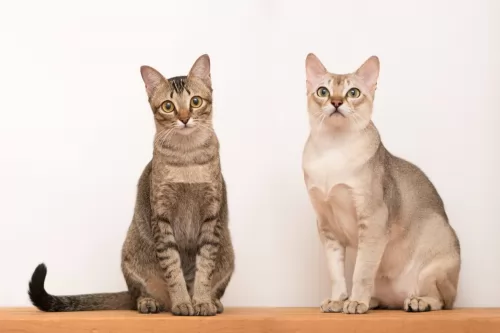 Your Singapura cat’s short coat is easy to groom. Brush your pet every week to remove the loose hairs and to also keep the coat sleek and shiny.
Your Singapura cat’s short coat is easy to groom. Brush your pet every week to remove the loose hairs and to also keep the coat sleek and shiny.
Every cat is a carnivore. Singapuras need meat if you want to avoid your cat getting some of the cat health problems there are. Singapura’s digestive system isn’t designed for foods that humans eat.
He will need high-quality food to ensure his ongoing good health. If you are going to feed your Singapura commercially packaged foods, take a good look at the ingredient list and make sure that meat and protein is at the top of the list.
Always buy age-appropriate food. You can imagine that a tiny kitten’s food requirements will be very different to that of an adult cat.
A kitten will require at least 3 or 4 meals a day. It is always a good idea to consult your vet for suggestions on what brand- and type of food to give your kitten and your adult Singapura.